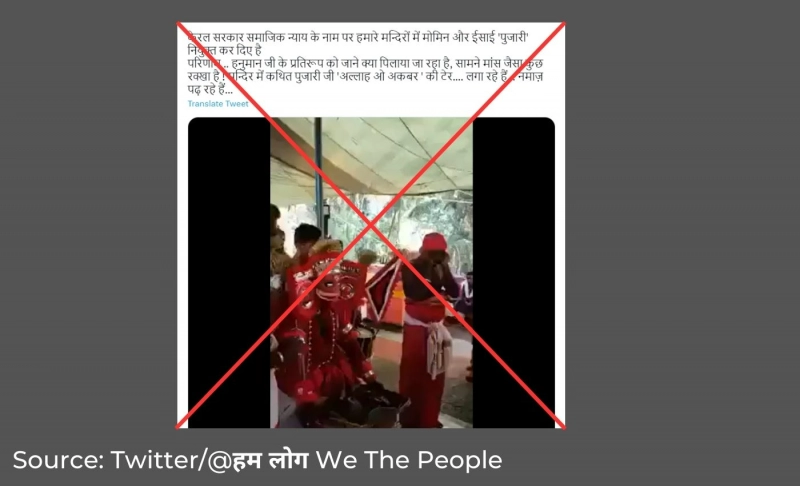By: Ankita Kulkarni
April 11 2023

The video of a ritual act called the ‘Theyyam,’ which traditionally includes Muslim prayers, is viral with a false communal spin.
Context
In the past few years, the Indian state of Kerala has been the center of many misleading narratives that have often threatened to disrupt the communal harmony of the region. Recently, a video showing a man giving adhan — an Islamic call to prayer — standing next to a person dressed in a mask and costume has been shared with the claim that Muslim priests have been appointed to temples in Kerala. Several social media users shared the video with the claim, "In the name of social justice, the Kerala government has appointed Muslim and Christian 'priests' in our temples. Result. Don't know what is being fed to the image of Hanuman ji, something like meat is kept in front of him! In the temple, the so-called priest is chanting 'Allah o Akbar'... is offering Namaz (sic)." On Twitter, one user shared the claim with the video and garnered almost 40,000 views; however, the video has been miscaptioned.
In Fact
A reverse image search showed us that this video was also posted on the YouTube channel of the Malayalam news channel MediaOne TV on December 23, 2023. The video caption, translated from Malayalam, reads, "Video of Theyyam reciting the adhan has gone viral. Footage from Kasaragod," and the description notes, "Video of Bapirian Theiyat and Manichi," which was performed at the Hindu temple in Kasaragod. An article from The Indian Express published on January 16, 2023, also reported on the same video, stating that it shows a Theyyam performed in Kerala.
The Kerala Tourism website, run by the state government, notes that Theyyam is a ritual art that often narrates a story of a local hero/deity worshipped by the community. The art form includes performers who wear makeup and costumes to represent heroes. To learn more about Theyyam, Logically contacted a team of journalists from The Malabar Journal, a web portal based in Kerala, who wrote to us clarifying that the viral video in question shows a Theyyam performance. The team explained that there are 500 forms of Theyyam, and the two persons seen in the video are dressed as Bappiriyan (also known as Babbiriyan) and Manichi and are unrelated to Lord Hanuman, as claimed in the viral post.
A report in Samayam Malayalam, run by The Times of India, noted that Babbiriyan is a character in folklore, believed to be a Muslim merchant who was a ship's captain, in which Hindu goddess Arya Poonkani was sailing in Kerala. Manichi was a native woman who married Bappiriyian after a romantic spell. However, Babbiriyan was killed in a battle, and Manichi as a widow, also became a Theyyam deity after her death. Since then, the two have been worshipped by the local community.
According to The Malabar Journal team, the story of Babbiriyan and the Hindu goddess Arya Poonkani is an example of Hindu-Muslim harmony in the state. This is why the Theyyam includes Muslim prayers. This Theyyam is performed in the North Malabar districts of Kannur and Kasaragod in Kerala. A team member said, "From the very look and other details, we could understand that it is a Muslim Theyyam."
This kind of art is celebrated on Kaliyattam, a calendarized event every year held in December when all deities are worshipped and enacted as Theyyam. “The right to perform this dance ritual belongs to specific Hindu communities, and a person from the Nalkkadaya caste has performed in the video,” the team member told Logically.
The team also said that Theyyams are a significant part of a local culture where a person dresses into a respective deity, which shows devotion and faith in worship. Theyyams are also attended by Muslims, depicting the continuation of cultural relationships between both communities. They added that Theyyams existed parallel to the Vedic worship systems.
The Verdict
The video shows a ritualistic art form called Theyyam, and the one being performed in the video includes Muslim prayers owing to folklore. Social media posts using the clip falsely claim that a Muslim priest was appointed to a Hindu temple in Kerala. Therefore, we mark this claim false.